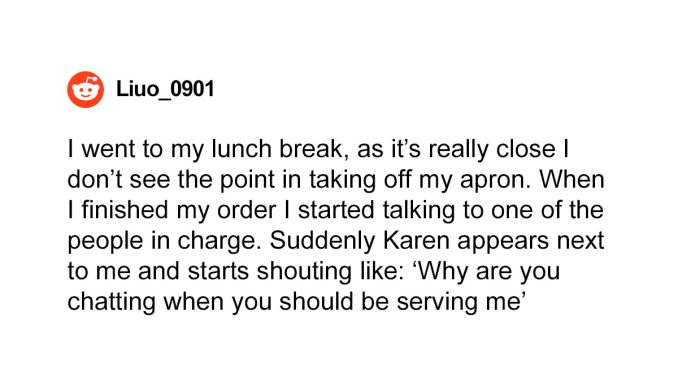
Few people are as passionate about fighting for the truth as the so-called Karens; even if they’re wrong.
Redditor u/Liuo_0901 recently told the ‘I Don’t Work Here Lady’ community about having to deal with one. The ‘Karen’ thought the OP was an employee at a cafe they were at, which could be an honest mistake as she was wearing an apron. The problem was, ‘Karen’ continued yelling orders at the redditor even after being told she didn’t work there.
Dealing with certain customers can be more demanding than one might think
Image credits: Ketut Subiyanto (not the actual photo)
This ‘Karen’ was causing trouble at a cafe after she mistook a fellow customer for an employee
Image credits: Afif Ramdhasuma (not the actual photo)
Image credits: Gary Barnes (not the actual photo)
Image credits: Liuo_0901
‘Karen’ is a broader term encompassing quite a few dissatisfied characters
Image credits: Karolina Grabowska (not the actual photo)
Working in customer service requires patience; loads of it. While some clients are perfectly polite, others become a test of how much an employee can endure without exploding back at them; and the latter group often features a so-called Karen or two.
It might not be fair to use this one name to refer to a collection of arguably aggravating women, but a ‘Karen’ has become a term so widespread that its holder no longer needs a description. According to Know Your Meme, she is typically characterized as an irritating and entitled woman; however, it is a moniker that entails quite a few characters, such as ‘Permit Patty’, ‘BBQ Becky’, or ‘Golfcart Gail’, who all boiled down to this final version, BBC reports. (Oh, let’s not forget ‘Cornerstore Caroline’ as well.)
A couple years ago, a business comparison service, Bionic decided to check if it was actually Karens that tend to complain the most. They carried out a humorous study, which showed that despite being in the top ten—number eight on the list, to be exact—’Karen’ is not the name of the person who complains the most.
After analyzing thousands of complaints from all over the world, the company found that the name Louise was seemingly the most common among dissatisfied people; it was followed by Ann and Jane. As for the men, their equivalent of a ‘Karen’ was found to be John, with David and James coming second and third respectively.
Of course, these are just coincidences, which in no way mean that all Karens, Louises, or Davids bear annoying qualities. However, it’s pretty safe to assume that, no matter the name, there are people with such qualities everywhere. Bionic revealed that the US is the country where people tend to complain the most, but the UK, Canada, Philippines, and Mexico are close on the list.
‘Karens’ are a common nightmare for customer service workers
Image credits: Ketut Subiyanto (not the actual photo)
Typically exceedingly annoying, Karens are a common headache for customer service workers, especially considering the prevalence of the “the customer is always right” motto. But known for their requests to see a manager, such customers might be wrong, too. Take the OP’s example, for instance.
That might make one wonder, what is there for an employee to do when faced with a troublesome ‘Karen’? MindTools covered five steps that can help deal with a rude customer, the first one being staying calm and trying not to react to avoid biting back. Research suggests that employees who expect to face rude customers at work react to them less strongly than those with no such expectations, and in the case of the latter, fighting fire with fire would only escalate the situation even more.
Other tips include not taking the remarks personally, listening to them and apologizing if the situation calls for it, standing firm on things such as rules and regulations, and trying to find a solution to the customer’s problem if possible.
In the OP’s situation, finding a solution couldn’t have been easy, mostly because the ‘Karen’s’ comments and demands were unfounded. Be that as it may, Arthur came in to save the day, and the redditor was left with a funny story to share with their co-workers.
